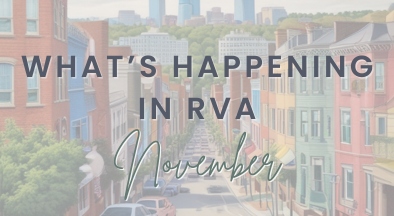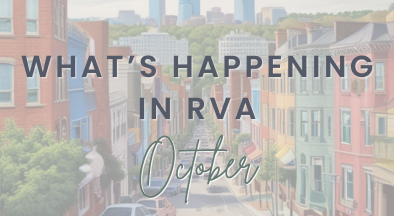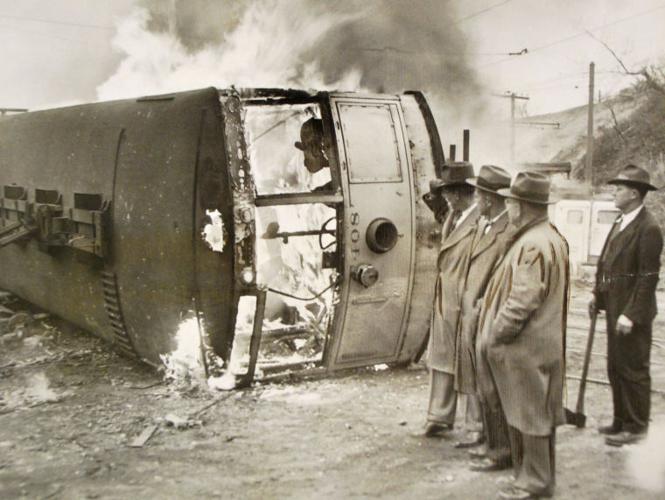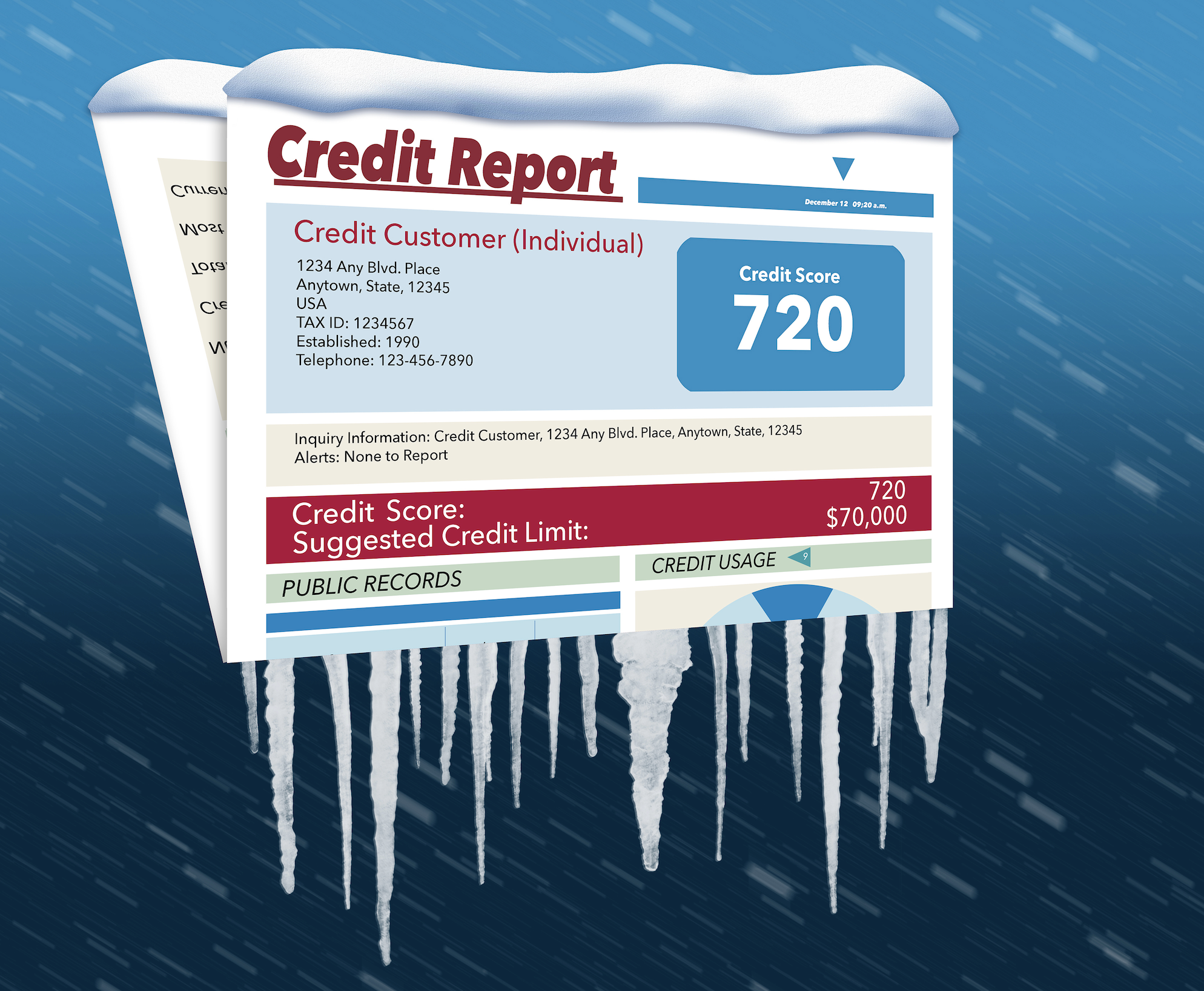Blog
Welcome and thanks for stopping by! My blog is filled with market updates and real estate info, but also Richmond area spots and favorites, fun stories and lots of recipes that I love (please try them!).
I love to share, and never gatekeep, so please bookmark my blog, check back often, and of course, don’t forget to subscribe to my newsletter!
Are you running out of time? Shipping deadlines have passed, but you still need something amazing? If you're in the Richmond area, these are a few gifts and places I'd recommend! Food gifts Looking for something for the host/hostess, or just a little something for that hard to buy for recipient? Food is always a great answer! Here are some of my local favorites: Copper Fox Distillery- With locations in both Sperryville and Williamsburg, Copper Fox makes some great, American Single Malt whiskies (and so many other spirits). I'm not a big drinker, but it is delicious, and if you take a trip, you can get a behind the scenes tour, which is pretty fantastic on its own. Stock up for gift giving all season, or for your own bar. Are you on the list? Every year, a lot of my clients get a gift of croissant cinnamon rolls from me, from one of my favorites, Up All Night Bakery. They're always a huge hit, and it's a great alternative to the flood of cookies that often come with the holidays. A little treat for breakfast is always a welcome gift. (And everything they make is fantastic!) Looking to put together an amazing basket or box of RVA goodies? My favorite spot to run in and grab some goodies is Yellow Umbrella. Either location- Patterson Avenue or Libbie Mill- has all sorts of great grab and go party foods, chips, salsa, crackers, local snacks, and of course, everything you need for dinner or charcuterie. A great host gift? A loaf of fresh sourdough and a block of my favorite Isigny Ste Mere Butter with sea salt crystals. For just about anyone on your list, pop into Shop Made in Virginia in Scott's Addition and pick up anything from fabulous art, handmade jewelry, textiles, locally made craft kits and gifts for kids, and all sorts of Virginia made foods. Seriously, you could totally check off everyone on your list here. Another spot where it's easy to find something for just about anyone on your list is The Shops at 5807. With a multitude of shops under one roof, you can't go wrong. Maybe some fun readers for Mom from Frillseekers, a great shirt for Dad from Cronies, something useful and fun for the wine lover at All About the Beverage, and of course, a stop through RVYAY Toys for the kiddos. (There are plenty of things for the hard to buy for teens, etc, with great jewelry, fun stationery, and so much more!) It really is possible to avoid the mall (and Amazon!) and get everyone on your list something local! Happy Happy Holidays to you and yours! See you in 2025!
Read more
Things to Do in RVA this November Sips and Style Holiday Event Where: LaDiff (1011 Commerce Rd) When: November 6th @ 6-7:30pm Hosted by: LaDiff and Virago Spirits What: Learn how to prepare your home for the holidays and enjoy tastings of festive cocktails and mocktails. Diwali Celebration at the VMFA When: November 10th @ 6-10pm Where: Virginia Museum of Fine Arts What: An evening of traditional music, dance, and culinary delights. Richmond Marathon When: November 16th Gardenfest of Lights When: November 18th - January 5th Member Preview Weekend: November 15th - 17th Where: Lewis Ginter Botanical Gardens RVA Turkey Trot 5k When: November 28th Where: Dogwood Dell Amphitheater Cirque Dreams Holidaze When: November 29th and 30th Where: The Altria Theater Christmas at the Inn Arts and Craft Show When: November 29th - December 3rd Where: Virginia Cliffe Inn (2900 Mountain Rd) What: A showcase of local crafters' handmade items, festive decor, and seasonal treats.
Read more
Let's talk about my top 10 questions to ask a potential buyer's agent when choosing someone to represent you when buying a home. Ask any general questions you might have about the buying process. How many houses will you or should you be looking at? Are they familiar / what do they know about the area where you are looking to buy? What is their communication style? How are they at negotiating? What is their experience negotiating? Do they have an area or distance they won't show houses in? Are they familiar/up to date on all the forms and legalities of real estate? What will you have to pay for their services and what do you get for that commission? Are they a full-time agent? Are you a solo agent or do you have a team? Have questions? Ready to talk real estate? Send me a message via Instagram at CindyBennettRealEstate or via my website.
Read more
So, I've learned not to buy my candy well before Halloween (and it took me WAY too long to learn that!) but sometimes, I do have leftovers. Rather than keep those for myself, I make these cookies, then give them away! These are the cookie that I've always wanted- that salty sweet and buttery taste from the brown butter and the sea salt, the variety of the candy- crispy, chewy, delicious. They are great just with chocolate chips, or with really any ad ins you have! Enjoy. Baked By Melissa's Brown Butter Halloween Candy Cookies Ingredients 1 cup (2 sticks) unsalted butter 3/4 cup granulated sugar 3/4 cup brown sugar, packed 2 teaspoons vanilla extract or paste 2 large eggs 2 1/4 cups all-purpose flour 1 teaspoon baking soda 1 teaspoon salt About 2 cups of various Halloween candy, cut into small pieces if necessary (M&Ms, Milky Way, Reeses, Snickers, etc! You can also throw in pretzel pieces for extra crunch/salt) Flaky sea salt, to top How to Make Your Halloween Candy Brown Butter Cookies Directions Preheat the oven to 350°F and line a baking sheet with parchment paper. In a medium saucepan, melt the butter over medium heat and swirl occasionally until brown specks form (about 5-7 minutes). Once these specks appear and it smells slightly nutty, remove from heat and let cool. Don't walk away, it can burn quickly. Combine the butter and sugars in the bowl of a stand mixer and beat on medium-high speed for 3-5 minutes, until light and fluffy. Add the eggs one at a time, mixing between each addition, followed by the vanilla. Mix in the flour, baking soda, and salt, and stir on medium-low until a dough forms. Fold the candy into the dough until just combined (being careful not to overmix). Place the mixing bowl in the fridge to chill for at least 30 minutes or up to 24 hours. Chilling helps the cookies bake more evenly. if you're in a rush you can skip this step, but I highly recommend it- it truly makes a huge difference! Remove the chilled dough from the fridge and let sit for 5-10 minutes so it's pliable. Scoop the dough onto the baking sheet and top each ball with additional candy or chocolate chips. Bake for 12 minutes, until lightly golden. Immediately after you remove the cookies from the oven, swirl a large glass or biscuit cutter around them to get a perfect circle. Top with flaky sea salt and TRY not to eat them all at once!
Read more
Things to Do in RVA this October October 5: Junior League's Touch a Truck Where: Richmond Raceway When: 10 am to 3 pm October 8th & 9th: Armenian Food Festival Where: 834 Pepper Ave, Richmond, VA 23226 When: 11 am to 8 pm October 13th: Party on the Avenues Where: Libbie Ave between Patterson to Guthrie When: 12 - 6 pm October 27th: Lewis Ginter Harvestfest Where: Lewis Ginter Botanical Gardens When: 10 am - 3 pm For more events this fall check out my fall guide HERE.
Read more
Welcome! If this is your first time here, I'm starting a new series for my newsletter and blog talking about some of the things you may not know about the Richmond area. Born and raised here myself, I have plenty of stories, but my dad had even more, and I always loved to hear them, and have him point things out while we were driving around town. Obviously, Richmond is filled with history- much of it complicated to say the least, but good or bad, it's always interesting, to me at least. Hopefully you'll find some of these things interesting too! Please let me know if you do (or if you don't) and if you have any questions or stories to share, please message me! So without further ado, here's the first installment! The Richmond Union Passenger Railway, and Where It Went You may or may not know that Richmond, Virginia had the first (in the world) electric trolley system. While many places had tried to create a working system, no one was able to actually make it work. That is, until the powers that be in Richmond heard about Edison's colleague Frank Sprague and his experiments with electric transit in New York and invited him to Richmond to build one here. He and his team actually did the thing, and making it up as they went along, came up with a system of four wheeled cars attached to an overhead electric line and 12 miles of track, and the Richmond Union Passenger Railway was officially put into operation on February 2, 1888. Eventually, the system grew to 82 miles of track, and enabled much of the expansion of the city and its population. People were able to move further out, and they were still be able to come into the city without having to spend the day walking. This led to the development of Richmond's first suburbs, or "street car neighborhoods." These were Ginter Park, Bellevue, Barton Heights, Highland Park, Laburnum Park, Sherwood Park, the West End, and Forest Hill. The birth of our electric rail system also led to the development of 110 others across the country and the world. Pretty cool, huh? By 1949, though, cars were becoming more prevalent, and General Motors introduced buses to be used for public transit, and the cars fell by the wayside to make way for more gas powered vehicles. (Lots of thoughts, and even a court case, were based on the idea that GM and other auto makers conspired to get rid of the streetcars and make way for more of their own vehicles.) The writing was on the wall, and in December 15, 1949, trolley No 408 made its last run, followed by nine others, and hundreds of onlookers. Somewhat perplexingly, No. 408, along with 50 other cars, were not just decommissioned, but burned to nothing in the "Great Car Burning of 1949." Very few cars, or even parts of cars, exist. Our street car system may be long gone, but we have it to thank for some of our most beautiful streets, particularly in the North Side of Richmond. They were specifically designed to allow for carriages, pedestrians, and those trolleys, with wide roads, sidewalks and lined with beautiful trees.
Read more
Things to Do in RVA this September September 6-8: Richmond Brunch Weekend 2024 Friday: Kickoff Block Party Final Gravity | 5:30 - 9 p.m. Saturday & Sunday: Have brunch at one (or more) of the 30+ partner restaurants September 14: Richmond Makers Market Where: Cultural Arts Center at Glen Allen When: 12 p.m. - 6 p.m. September 15: End-of-Summer Market Where: Agecroft Hall When: 12 p.m. - 5 p.m. September 20-21: Fall Plant Sale Where: Lewis Ginter Botanical Garden When: 9 a.m. - 3 p.m. September 21: Run Richmond 16.19 Where: Brown's Island When: 8 a.m. - 11:15 a.m. September 21-22: Bier Garden Where: Maymont Gardens When: Friday: 6 p.m. - 10 p.m. Saturday: 11 a.m. - 10 p.m. September 27-29: Richmond Folk Festival Where: Brown's Island When: 12 p.m. - 8 p.m.
Read more
This is a super easy weeknight meal that really can be great on its own, with crusty bread, rice, or of course, pasta. This was a staple in the busy week repertoire when my son was young. Always popular with everyone, and still a favorite! This is bit of a variation on a Giada recipe from years ago. Adding the zucchini in to the turkey keeps it from being dry, so don't skip that step. This one is easy to make ahead and just put in the oven when you're ready! Ingredients 2 tablespoons olive oil 1 small onion, grated 1/4 cup chopped fresh Italian parsley leaves 2 tsp dried oregano 1 large egg 3 tablespoons ketchup 3 garlic cloves, minced 1 tsp salt 1/4 teaspoon freshly ground black pepper 1/3 cup grated Parmigiano Reggiano (use good parm!) 1/4 cup dried plain bread crumbs 1 pound ground turkey 2 zucchini, ends removed, halved lengthwise 1 short orange bell pepper, halved and seeded 1 short red bell pepper, halved and seeded 1 short yellow bell pepper, halved and seeded 1 1/2 cups marinara sauce (I use Rao's or Carbone) Directions Preheat oven to 400 degrees F. Lightly drizzle the olive oil into a 13 by 9 by 2-inch baking dish. Using a melon baller or spoon, carefully scrape out the seeds and inner flesh from the zucchini, leaving 1/8-inch-thick shells. Be careful not to pierce through the skin. Finely chop the inner flesh of the zucchini. Whisk the onion, zucchini, parsley, oregano, egg, ketchup, garlic, salt, and pepper in a large bowl to blend. Stir in the cheese and bread crumbs. Mix in the turkey. Cover and refrigerate this mixture. Fill the zucchini and pepper halves with the turkey mixture, dividing equally and mounding slightly. Arrange the stuffed vegetables in the baking dish. Pour the marinara sauce over the stuffed vegetables. Bake uncovered until the vegetables are tender and beginning to brown and a thermometer inserted into the filling registers 165 degrees F, about 45 minutes. Transfer the stuffed vegetables to a platter and serve.
Read more
Should You Freeze Your Credit?? Whether or not you're thinking of buying a home, we all know that having a strong credit score is an important component in your financial picture. Perhaps even more important is knowing that the credit score you worked for is secure, and no one is opening credit in your name without you knowing. There are hundreds (thousands?) of services out there that will charge you to monitor your credit, and lots of free ones as well, but the best way to make sure you don't become a victim of identity theft is to freeze your credit, effectively locking the door to anyone trying to do a hard pull on your credit. In light of the recent social security number breach (read more HERE), it's more important than ever, and it only takes a few minutes. All you need to do is go to all three credit bureaus, enter a bit of info, and you're all set. Equifax TransUnion Experian Just remember that if you want to apply for a loan, get a mortgage, a credit card (or even those "buy this for five easy payment" type things), you'll need to unfreeze it first. Yes, even if you're at a store and get a discount if you open a card, you're not going to be able to do that either. (Most insurance, too.) But if you want to do anything that will pull your credit, just hop online and unfreeze, then refreeze it when that's been done. Another little tip that a lot of people don't know about is Opt Out Prescreen. You know how you'll get "prequalified" for offers of credit, whether for a car loan, a credit card, etc? This happens even more when you apply for a mortgage. That info flags other lenders to know that you're getting a mortgage, and you just may get calls, etc. (Yes, the credit bureaus sell your info if you don't opt out.) You don't even need to go to all three bureaus. Just visit OptOutPrescreen and you can opt out for 5 years online, or opt out permanently by mailing in your request. A bonus of this? I get SO much less junk mail, too!
Read more
Things to Do in August If you are looking for things to do with friends, family, or even solo as the summer wanes, check out some of the events happening around Richmond this month below. August 17th: Richmond Water Lantern Festival Head over to Dorey Park with the family and participate in the Water Lantern Festival. Each adult ticket comes with a lantern kit, candle, and more. Click the link above to get your tickets today. August 17th: Richmond R&B Festival From 3-10 pm, head over to the Kanawha Plaza on East Canal Street to enjoy the Richmond R&B Festival. There will be delicious food, drinks, and live performances all day. Click the link above for more information and tickets. August 24th: Ashland Half Marathon & 5k Good news for those marathoners, runners, or people who just want to get moving. Ashland is having a half marathon and 5k on August 24th. The half marathon starts at 6:30 am with the 5k following at 7:05 am. Click the link above to register or get more information. August 24th: 5th Annual Crabs, Beer, & Spirits by the James Head on down to Kanawha Plaza between 12 and 8 pm for all-you-can-eat crabs, live music, specialty vendors, and so much more! Tickets are on sale now, so don't wait too long or you might miss out. Click the link above for more information.
Read more


